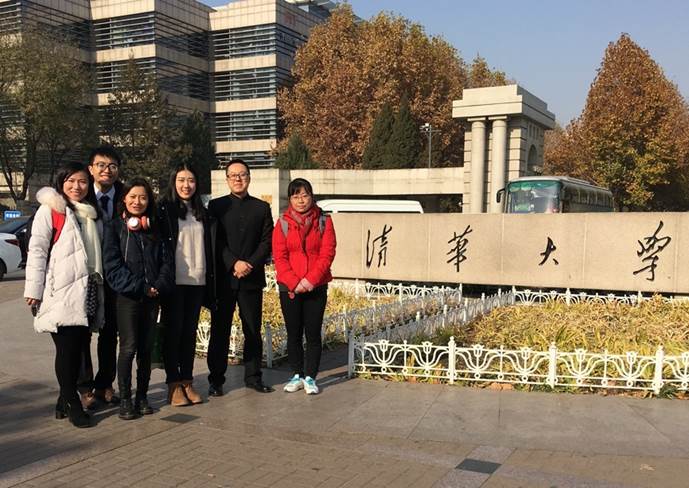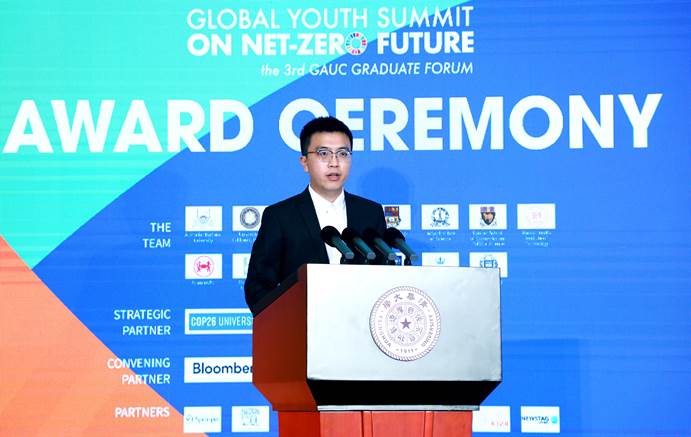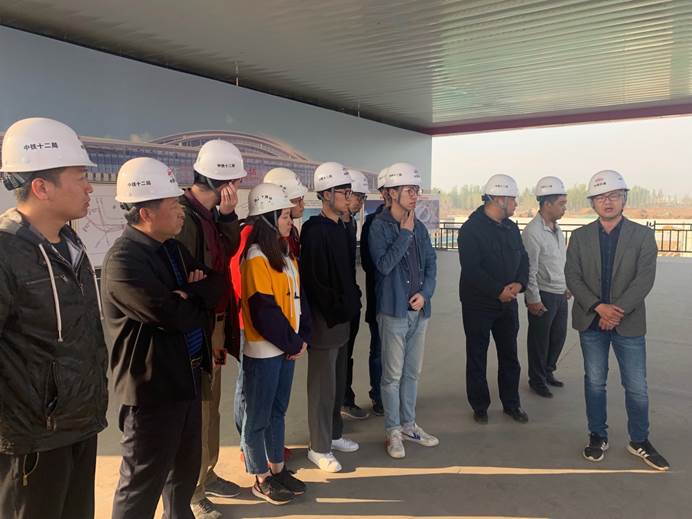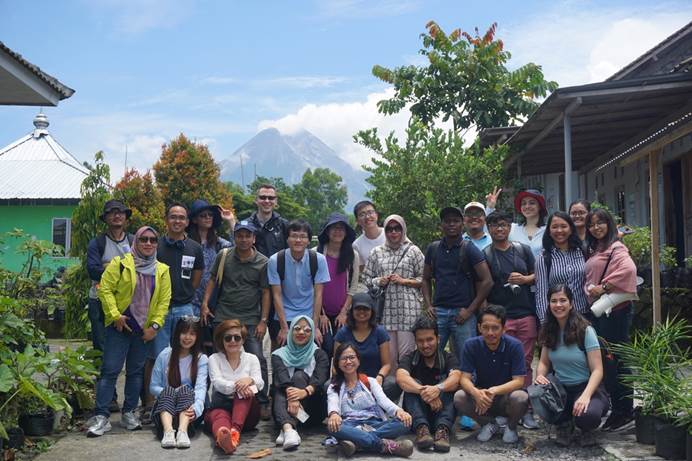Editor’s note: Deng Zhu, a 2019 doctoral student in the Department of Earth System Science, Tsinghua University, studies under Associate Professor Liu Zhu, with his research focused on the construction of high-resolution carbon emission inventory. He has built Carbon Monitor, the only global carbon emission database updated in near real time, which has been adopted as basic data by international organizations such as the United Nations Environment Programme (UNEP) and the World Meteorological Organization (WMO). He has won honors such as National Scholarship for Postgraduates, Beijing Merit Student, Best Paper Award of Global Youth Summit on Net-Zero Future, among others, and served as assistant of moral education in the Graduate Affairs Office of the CPC Tsinghua University Committee, chairman of the Graduate Union of the Department of Earth System Science, and monitor of Class 2016 of the Graduate Program of the Department, etc. He won the Tsinghua University Jiang Nanxiang Scholarship in 2021.
Stick to One Goal
Carbon emission data serves not only as a basis for research on climate change, but also as a “ruler” to measure countries’ emission reduction responsibilities. However, the current carbon emission database still suffers some defects, such as low timing resolution and long update lag time. As global climate action becomes increasingly imperative, it is urgent to monitor human carbon emissions more dynamically. However, how to realize the dynamic monitoring of carbon emission changes is an unsolved challenge for the world. From the start of doctoral studies, Deng Zhu has been conducting his research around the direction of “high-resolution carbon emission inventory construction” under Liu Zhu, an associate professor in the Department of Earth System Science.
Deng Zhu’s primary problem after entering the doctoral program was the study of professional knowledge. Previously, Deng majored in remote sensing and geographic information science, having not acquired emission accounting methods and related knowledge of ecology and atmosphere. To make up for the knowledge gap in this regard as soon as possible, on the one hand, Deng Zhu borrowed all relevant specialized books in the library and taught himself to make up for the basic knowledge; on the other hand, Deng Zhu collected all the documents published by his supervisor and related collaborators, and learned about academic frontier issues and specific methods by reading the documents. Deng Zhu has also developed the habit of carrying a laptop with him, racing against time to learn knowledge and solve research problems. Once, Deng Zhu and his classmates visited a theme park together, when it happened to be tourism peak in summer. At the sight of the bustling team ahead, Deng took out his laptop from his schoolbag and continued his research work despite heat and noise.

Photo: Deng Zhu and his Supervisor, A/Prof. Liu Zhu as well as members of the research group
Occupy One Highland
After nearly one year’s study of basic knowledge, Deng Zhu made up his mind to take on the more challenging research highland of near-real-time accounting of carbon emissions. By solely relying on the traditional carbon accounting method, the lag of carbon emission data update could not be fundamentally solved. Therefore, the supervisor advised that Deng Zhu should create an interdisciplinary solution, that is, take advantage of existing expertise, draw on real-time big data such as Internet data and satellite data, and combine big data with traditional emission accounting models, to build a set of real-time quantitative assessment model and data system of carbon emissions based on multivariate data fusion. However, when some progress was just made in the research, in 2020, the outbreak of the COVID-19 pandemic hindered the research of Deng Zhu’s research group, because it became impossible for group members to meet and communicate with each other, which posed great challenges to the advancement of research work. To release the results as soon as possible ahead of overseas counterparts, the research group raced against time. Deng Zhu, besides engaging in research work, played the role of "liaison" for the group. In order to coordinate the time of the members of the research group at home and abroad, Deng Zhu got up at seven o’clock every morning on time, organized discussions, collected opinions and gave feedback on research progress ... It was normal from him to work until one or two o’clock in the morning.
Deng’s hard work paid off. Finally, this real-time assessment model successfully quantified the daily changes of carbon dioxide emissions in the world and major countries since 2019, covering major fields such as electric power, industry, ground transportation, aviation, international shipping and household consumption. Carbon Monitor, the global near-real-time carbon database developed on the basis of the model, has become the global carbon emission database with the highest timing resolution and the fastest update speed. The database refreshes our understanding of the carbon emission pattern of human activities, depicts the daily dynamic changes of carbon emissions for the first time, and effectively fills the gaps of similar products. Deng Zhu, as the First Author, published the related research results in Nature Communications and Scientific Data, and was twice reported by Nature Journal (No.582 and No.589), and his paper was selected as an ESI hot paper and highly cited paper. As the only database in the world that can show the dynamic changes of carbon emissions, Carbon Monitor has been applied as basic data by international research institutions such as UNEP, WMO and GCP. Especially on the eve of the 26th United Nations Climate Change Conference (UNFCCC) this year, the World Meteorological Organization quoted the data of Carbon Monitor and issued a call that although the global public health incident caused by the COVID-19 pandemic has reduced the global carbon dioxide emissions, the extent of reduction is still far behind the emission reduction targets of the Paris Agreement, and countries should take and implement more actions on emission reduction.
This work has also been widely recognized: the “Carbon Monitor” project team led by Deng Zhu won the championship in the 10th Tsinghua University Creative Competition and the 2021 Tsinghua Student Great Idea Challenge; At this year’s Global Youth Summit on Net-Zero Future, Deng Zhu won the Best Paper Award and reported his work as a representative at the Award Ceremony ...

Photo: Deng Zhu, as the Best Paper Award winner, addressed the Award Ceremony of the Global Youth Summit on Net-Zero Future
Follow One Original Aspiration
As a member of the Communist Party of China for nearly ten years, Deng Zhu has always been following the original aspiration of “serving the people wholeheartedly”. He has served students on various posts, including assistant of moral education in the Graduate Affairs Office of the CPC Tsinghua University Committee, chairman of the Graduate Union of the Department of Earth System Science, and monitor of Class 2016 of the Graduate Program of the Department. As a class assistant for freshmen in Class 2018 of the Graduate Program of the Department of Earth System Science, Deng Zhu took the initiative to contact all freshmen of the department before they entered the university, communicated with them for the first time by SMS and phone, and added each freshman’s WeChat accounts to help them prepare for school and helped solve their various difficulties when they entered the university. After the freshmen started school, Deng Zhu drew on the experience he had accumulated in team building and assisted the Party Committee of the class to jointly build a cohesive team. Besides, Deng Zhu also attentively helped every freshman to solve practical problems. Ren Zhehao of Class 2018 of the Graduate Program of the Department of Earth System Science still remembers that when he first entered school, he once suffered setbacks in both research and social work, and Deng Zhu, then a class assistant, offered him timely help. “Mr. Deng talked with me for a long time, trying to enlighten me from my point of view. I still remember that I didn’t have dinner that night and Mr. Deng made a bowl of hot seafood noodles and sent it to my dormitory. I will never forget his kindness.”

Photo: Deng Zhu is organizing the 2018 Party Branch of the Graduate Program of the Department of Earth System Science to visit Xiong’an new area to carry out thematic practice
Perform One Mission
As a graduate student in the field of earth system science, during the five years of studying on the Tsinghua campus, Deng Zhu has visited twelve countries and regions on four continents, broadening his global vision and experiencing global changes in practice. In 2019, Deng Zhu took part in a program for young scholars held in Indonesia to investigate the climate adaptive action of urban waterlogging in Jakarta, Indonesia. Due to global warming, the global sea level is rising, and extreme weather events are becoming more frequent. Jakarta, as a coastal city threatened by frequent and powerful floods, has become a “sinking city”. During the investigation, Deng Zhu saw many people displaced by floods and even bereaved of their loved ones. The government’s ineffective dredging and domestic garbage blocking rivers further aggravated the risk of waterlogging disaster. Faced with the threat of a rising sea level devouring the land border step by step, the government could only choose to relocate its capital. The research experience has deepened Deng Zhu’s understanding of the importance of building a Community of Shared Future for Mankind and strengthened his determination to pursue research on climate change.

Photo: Deng Zhu participates in investigation in Indonesia
Against the backdrops of China’s “carbon peaking and carbon neutrality” goals and facing the major issue of global climate change, Deng Zhu hopes to persevere in his research efforts on climate change and contribute to the realization of the “carbon peaking and carbon neutrality” goals by taking concrete actions.
A bright future is to be anticipated.
Written by Deng Zhu
Edited by Wang Jiayin